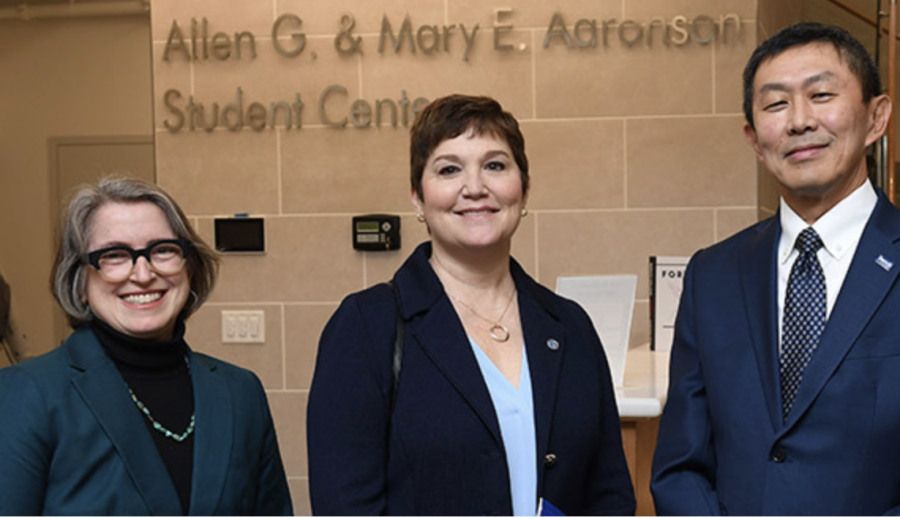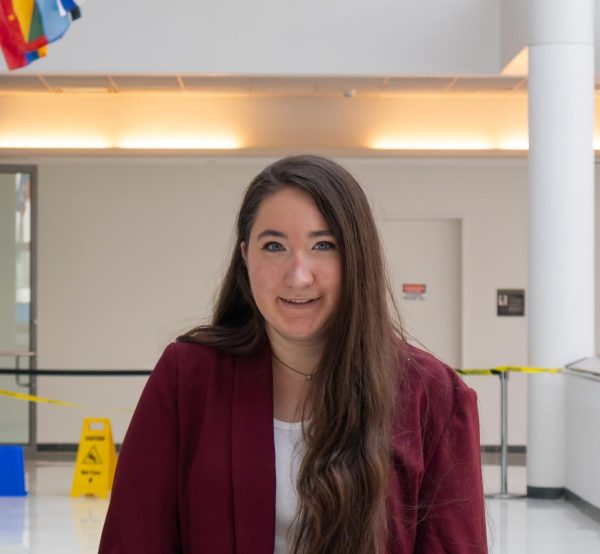CUNY Provost hears Baruch concerns in town hall; commits to action
November 19, 2022
Recently appointed CUNY Provost and executive vice chancellor, Wendy Hensel, hosted a town hall at Baruch College as part of her CUNY-wide ‘ ‘Listening Tours’ to hear faculty and student concerns.
Hensel praised Baruch’s commitment to its students and progress at the town hall.
“Even when we’re talking about hard things, and there’s lots of hard things to talk about these days, always in the background is that idea that we can do better and be better and be more for our students and for our communities and that we keep working until we get it right,” she said.
Hensel assumed her role in June 2022. She launched the first-of-its-kind ‘Listening Tours’ to connect with the different campuses and establish her era of leadership as one of communication, something CUNY Central has been criticized for lacking in the past.
During the event’s open Q&A portion, attendees challenged CUNY Central for its past but expressed hope that Hensel would continue initiatives like the Listening Tours.
“When I first got here the chancellor’s office was always called the Kremlin,” Douglas Lackey, a professor of philosophy, joked, earning laughter from the packed conference room. “The Cold War’s over as of today.”
Professor Glen Peterson from the anthropology department said he felt faculty concerns don’t reach CUNY Central.
“It seems to many of us here that the flow of resources, of information, of authority in the CUNY system, comes downhill from the governor to the Chancellor’s office to the President,” he said. “There’s very, very little it feels to us that goes up back to the Chancellor’s office.”
Peterson said while he was glad Hensel is building a bridge between the campuses and CUNY Central, ongoing action needs to be taken.
“You’re new here,” he said. “You are stressing to us your experience as a faculty member. Tell us please, how you’re going to change this so that it’s not just a matter of saying that we’re being listened to, but that we might actually feel listened to.”
Hensel acknowledged the validity of these concerns and assured the Baruch community that she was “not just box-checking,” but actually spending the full day at Baruch learning from faculty, administration and USG. She committed to raising the issues discussed with CUNY Central and continuing to visit.
“Absent an intentionality of connection, we will not connect,” Hensel said.
Allocation of tuition dollars was a primary focus for attendees of the town hall. While Baruch’s enrollment has increased despite falling enrollment across CUNY, tuition is dispersed throughout the schools.
“I can completely understand the argument that any additional tuition dollars should go to the university or the college that produces it, I think that makes a lot of sense,” Hensel said. “From the Chancellor’s perspective, of course, he has 25 campuses that he needs to ensure are operational, many of which are operating in the poorest areas of the five boroughs and have some of the weakest students.”
Hensel reminded the faculty that budgeting distribution should be looked at on a larger time scale.
“A few years ago, the community colleges were actually doing better than the senior [colleges],” she said. “It’s hard to remember those days, but that was true. Any snapshot in time will amplify inequity in a particular place and I think we’re trying to take the longer look there, but that doesn’t diminish the frustration of your current position.”
Hensel said that the budget allocation process is something CUNY Central will continue to evaluate. She said she hears the concerns raised by Baruch Provost Wendy Essig and others in Baruch administration regularly and will not ignore the need for resources.
Essig, who emceed the town hall, also shared that while touring Baruch Hensel had an “elevator moment.”
“I did see your buildings– I want to say that out loud,” Hensel said. “I saw some of the buildings that I found unacceptable and not because you are not doing what you need to do, but because we need to get more resources.”
Hensel addressed several questions about transfer credit challenges, an issue she said she is partnering with the University Faculty Senate on.
Transfer students make up a large percentage of the CUNY population with 20,000 students beginning as transfer students and only 18,000 students beginning as freshmen.
For many of those students, between 10 and 13 credits don’t transfer.
“It is not acceptable for students to come in and take courses and then experience the frustration and the lost financial aid, the lost momentum, the lost equity, of having those credits in the major not count toward the major,” Hensel said.
She added that it was important to recognize the transfer credit issue’s larger implications.
“When we consider that the students that are beginning in our community colleges are some of our most disadvantaged students, and black and brown students, it becomes an equity issue,” Hensel said.
Another challenge is preparing students for success after graduation.
Fostering paid internship opportunities and working with the Jobs Council to connect employers with the CUNY system are two steps Hensel said the chancellor’s office is taking to assist students.
“It’s critical that we help them make that bridge between what they’re learning in the classroom and the actual on-the-ground opportunities in the workforce,” she said.
Hensel listed her initiatives and also highlighted the importance of supporting faculty in addition to students.
One way Hensel said she will do this is through the Office of Research. She said she is in conversation with them to provide additional faculty training and increase resource allocation to the Research Foundation.
“I think both teaching in the classroom and research go hand in hand and are vital complements to each other,” she said.
She also told the present faculty that she is leading ongoing conversations about equitable workload distributions and salaries, opportunities for advancement and mentorship.
Hensel said she aims to provide support for faculty, administrators and students because she recognizes that success is interconnected.
“I want you to know that while you are working to meet their needs, we are working to meet yours because if you’re not at your best, you can’t do that for our students either,” Hensel said.







